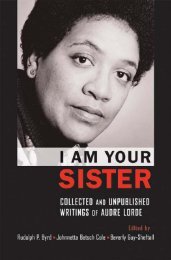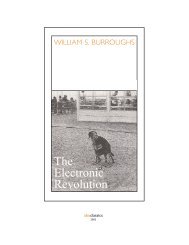Franco ''Bifo'' Berardi - The Soul at Work From Alienation to Autonomy
Franco ''Bifo'' Berardi - The Soul at Work From Alienation to Autonomy
Franco ''Bifo'' Berardi - The Soul at Work From Alienation to Autonomy
You also want an ePaper? Increase the reach of your titles
YUMPU automatically turns print PDFs into web optimized ePapers that Google loves.
In the context of the past bourgeois society, in the sphere of<br />
modern Enlightenment, the intellectual was not defined by hislher<br />
social condition, but as represent<strong>at</strong>ive of a system of universal values.<br />
<strong>The</strong> role <strong>at</strong>tributed <strong>to</strong> intellectuals by the Enlightenment was <strong>to</strong><br />
establish and guarantee-by the exercise of r<strong>at</strong>ionality-the respect<br />
for human rights, equality and the universality of law.<br />
<strong>The</strong> modern figure of the intellectual finds philosophical justific<strong>at</strong>ion<br />
in Kant's thoughr. Within th<strong>at</strong> context, the intellectual<br />
emerges as a figure independent from social experience, or <strong>at</strong> least<br />
not socially influenced in the ethical and cognitive choices slhe<br />
makes. As the bearer of a universal human r<strong>at</strong>ionality, the<br />
enlightened intellectual can be considered as the social determin<strong>at</strong>ion<br />
of Kant's "I think." <strong>The</strong> intellectual is the guaran<strong>to</strong>r of a thought<br />
freed from any boundaries, the expression of a universally human<br />
r<strong>at</strong>ionality. In this sense slhe is the guaran<strong>to</strong>r of democracy.<br />
Democracy cannot stem from any cultural roor or belonging, but only<br />
from a boundless horizon of possibilities and choices, from opportunities<br />
of access and citizenship for every person as semiotic agent and<br />
subject, who exchanges signs in order <strong>to</strong> have access <strong>to</strong> universal r<strong>at</strong>ionality.<br />
In this sense the figure of the intellectual is in opposition <strong>to</strong> the<br />
Romantic notion of the people, or r<strong>at</strong>her escapes from such a notion.<br />
Universal Thought, from which the modern adventure of democracy<br />
was born, is indeed an escape from his<strong>to</strong>ricity and the terri<strong>to</strong>riality<br />
of culture. Democracy cannot have the mark of a culture, of a<br />
people, of a tradition: it has <strong>to</strong> be a groundless play, invention and<br />
convention, r<strong>at</strong>her than an assertion of belonging.<br />
Both his<strong>to</strong>rical and dialectical m<strong>at</strong>erialism assert a completely<br />
different vision: the intellectual becomes the agent of a specific<br />
his<strong>to</strong>ric message, destined <strong>to</strong> descend from the his<strong>to</strong>ry of thought<br />
<strong>to</strong> the his<strong>to</strong>ry of social classes. In the eleventh of his <strong>The</strong>ses on<br />
Feuerbach, referring <strong>to</strong> the role th<strong>at</strong> knowledge must have in the<br />
his<strong>to</strong>rical process, Marx wrote:<br />
"<strong>The</strong> philosophers have only interpreted the world in various<br />
ways; the point, however, is <strong>to</strong> change it."!<br />
Marxist intellectuals conceive themselves as instruments of a his<strong>to</strong>rical<br />
process aimed <strong>at</strong> producing a society without classes. <strong>The</strong><br />
Communist project makes theory a m<strong>at</strong>erial power and knowledge<br />
an instrument <strong>to</strong> change the world. Only insofar as slhe takes part in<br />
the fight <strong>to</strong>wards the abolition of classes and wage-earning labor does<br />
the intellectual in fact become the agent of a universal mission.<br />
<strong>The</strong> role of intellectuals is crucial in 20th-Century political<br />
philosophy, specifically in Communist revolutionary thought,<br />
beginning with Lenin. In his book Wh<strong>at</strong> is <strong>to</strong> Be Done? Lenin<br />
<strong>at</strong>tributes the task of leading the his<strong>to</strong>ric process <strong>to</strong> the intellectuals,<br />
in the interest of the working class. <strong>The</strong> intellectual, being a free<br />
spirit, is not the agent of a social interest but serves the emerging<br />
interest, slhe identifies with the party which is the ultim<strong>at</strong>e collective<br />
intellectual. For Lenin, intellectuals are not a social class, they<br />
have no specific interest <strong>to</strong> support. <strong>The</strong>y can become agents and<br />
organizers of a revolutionary consciousness stemming f<strong>to</strong>m philosophical<br />
thought. In this sense, intellectuals are closest <strong>to</strong> the<br />
pure becoming of the Spirit, <strong>to</strong> the Hegelian development of selfconsciousness.<br />
On the other hand, the workers, despite being the<br />
agents of a social interest, can only move from a purely economic<br />
phase (Hegel's self-consciousness of the social being) <strong>to</strong> the conscious<br />
political phase (self-consciousness per se) through the<br />
political structure of the party, which embodies and transmits the<br />
philosophical heritage.<br />
30 / <strong>The</strong> <strong>Soul</strong> <strong>at</strong> <strong>Work</strong><br />
f ttl, H:J




